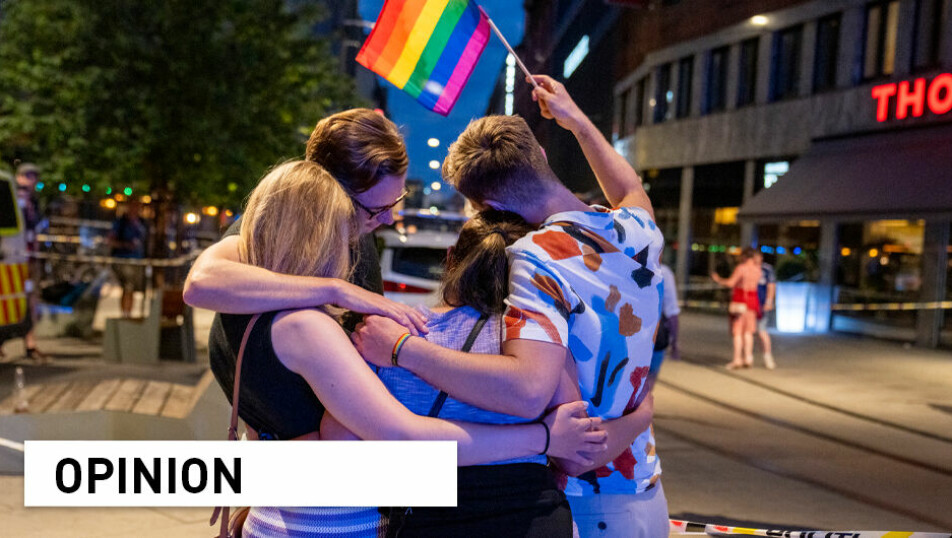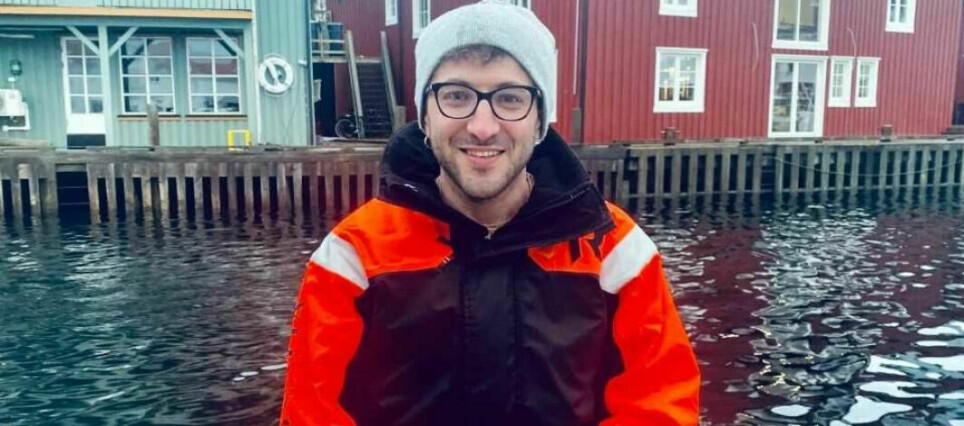
After the mass shooting in Oslo: “I started to feel like I had to hide my rainbow bracelet”
Queer people with minority backgrounds have to deal with both homophobia and racism after the attack in Oslo, according to researchers.
“I started to feel like I had to hide my rainbow bracelet and the pin I was wearing. It brought back trauma from when I had to hide my sexuality,” Alex Benjamin Jørgensen tells sciencenorway.no about how he experienced the attack in Oslo on 25 June.
Two Norwegian men were killed and 21 were injured when a man of Iranian origin started shooting at people near and in the popular LGBTQ+ bar London Pub in central Oslo. Subsequent pride parades and memorials were cancelled on recommendation from the police, citing they could not secure the events and did not have control over the situation.
Jørgensen is involved in the queer movement in many different ways.
Amongst other things, he does volunteer work as a project manager for visual productions in Oslo Pride and is the host of a podcast called Queerish. He is also former chairman of the board for Skeiv verden (Queer world) in Oslo and Viken.
Reawakened trauma
Jørgensen grew up in Lebanon and tells us that he hid his orientation from those around him for a long time. In Lebanon, he was arrested for two years for human rights activism and for being open about his own sexuality.
“Norwegians live in a country where it is legal and largely accepted to be queer. I came from a country where I had to hide my sexuality,” Jørgensen says. “My traumas resurfaced after the attack. The fear that people would find out I was gay, but also the feeling of insecurity and war.”
Jørgensen believes the attack in Oslo is extra difficult for queers from a minority background because many have worked put in a lot of work to accept their own sexual orientation.
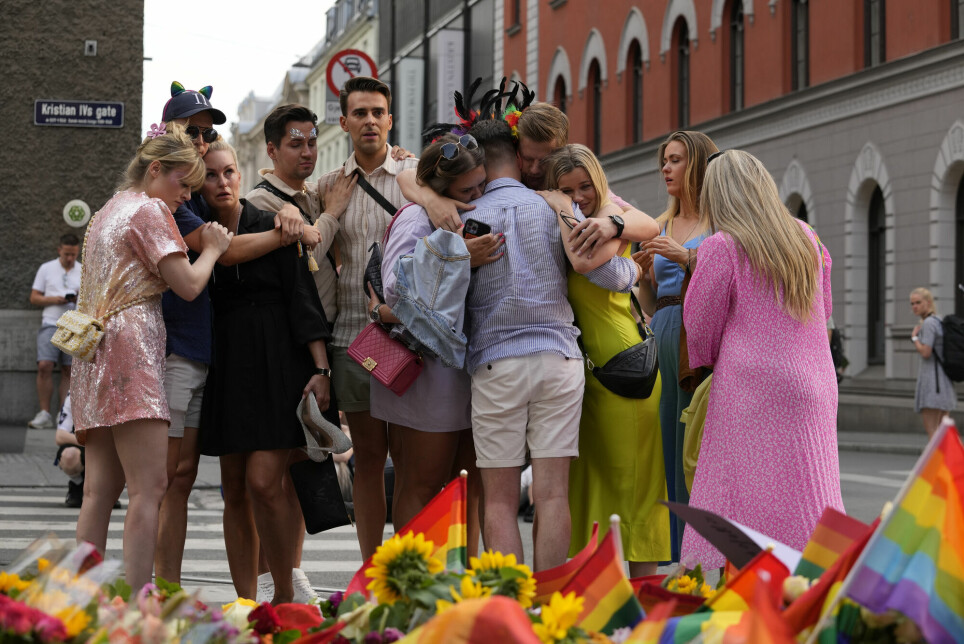
All of a sudden the village was safer
There are certain narratives that exist among queers, according to researchers Helga Eggebø and Elisabeth Stubberud. Eggebø works for Nordland Research Institute, Stubberud at NTNU.
One of these narratives is that small communities can be difficult places to live in.
Another is that the ethnic minority communities are characterised by homophobia and are therefore unsafe places for queers. This is in contrast to majority Norwegian communities, that are then assumed to be safe.
These perceptions are referred to as 'dominant cultural narratives' by the researchers.
“One of the stories was turned on its head after the attack in Oslo on June 25, where the villages were suddenly considered safe enough to organise pride,” Eggebø says.
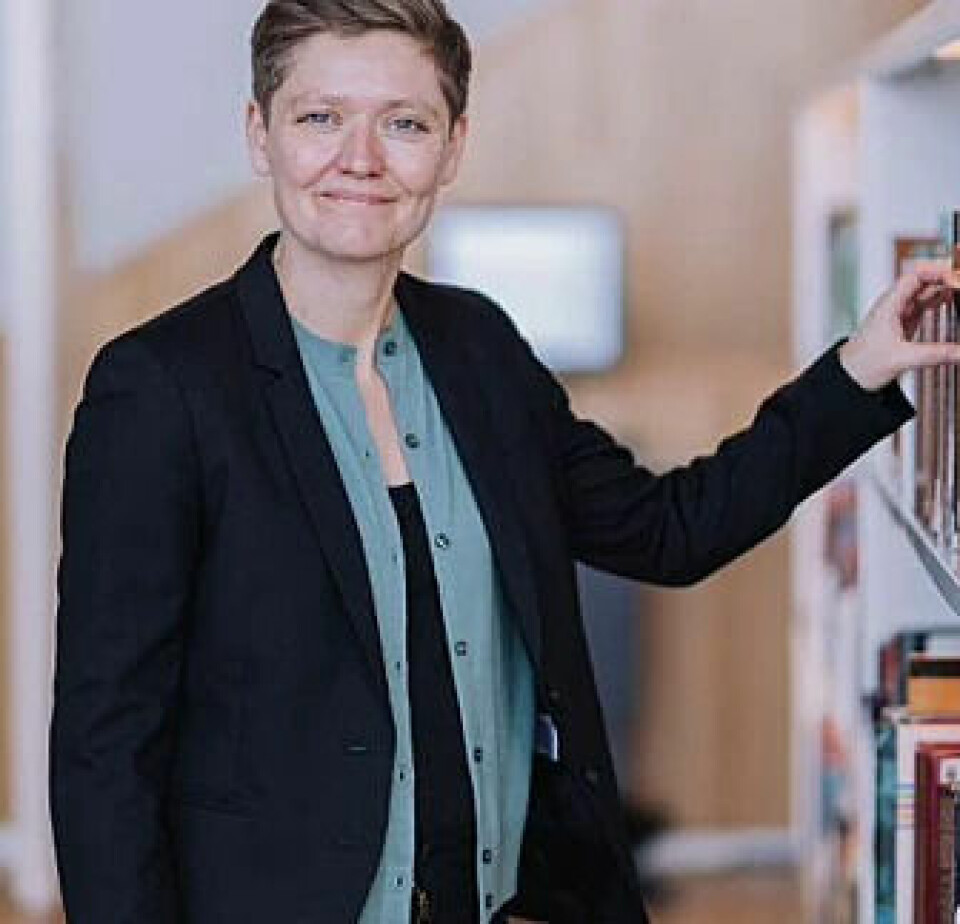
“The second cultural narrative however, was reinforced by placing homophobia as a problem onto a perpetrator with an immigrant background,” she says.
“At the same time, it is important to remember that it was precisely organisations such as Salam - the organisation for queer Muslims and Skeiv verden, Queer world, that were at the forefront in organizing the parade and memorial that took place in Oslo after the shooting,” she says.
Not wanting to feed the racism
Eggebø and her colleague Stubberud have recently finished writing a chapter about what it was like to be queer and a queer immigrant in the countryside in Norway in the 2010s, in a yet to be published book about queer local history.
“Many queer people with an immigrant background and who also have a Muslim background, or are believed to have it, have told us that they experience pressure in many ways,” Eggebø says.
“People have told us, for example, that they will not talk about negative incidents, violence, homophobia, or other things they experience from others with an immigrant background. Because if you talk about it, it feeds the racism that you are also exposed to,” she says.
Queer people with ethnic minority backgrounds also told the researchers that the majority population often does not believe that they experience acceptance from people with the same cultural background as themselves.
The perpetrator behind the attack in Oslo on 25 June continues to refuse to speak to the police, and so the motivation behind the attack is still not known. Regardless, Eggebø is concerned about the experiences of queers with a minority background in the aftermath.
“The attack on June 25 – carried out by a man with an Iranian background – may help to reinforce Islamophobia and racism. Our research shows that queers with an immigrant background are exposed to both homophobic and racist hatred,” says Eggebø.
“Do we have to hide again to be safe?”
Alex Benjamin Jørgensen explains that many queer immigrants have come to Norway to be able to be who they are and feel safe.
“When the attack happened, people began to ask themselves if we have to hide again to be safe and if we again have to suppress the feelings we have for someone of the same sex,” he says.
Although the attack has hit Jørgensen and those around him hard, he says that something more than fear came out of it.
“I think the purpose of the attack was to scare people from participating in such events, but the aftermath has been very inspiring,” he says.
Instead of the rainbow colours disappearing from the streets, people gathered for an impromptu pride parade on the Saturday of the cancelled parade, and they gathered for a memorial service at the City Hall Square in Oslo, despite the official memorial also being cancelled on recommendation from the police.
Stronger together
“When the attack happened, I posted a picture of me and my boyfriend. I have never been as proud to be gay as I am now,” Jørgensen says. “Instead of people staying scared, we became stronger together.”
He also noticed how the various queer organisations came together.
“Yes, we have our disagreements, but when it comes to human rights and our safety, we stand together. Nothing can take us back to where we were 50 years ago,” Jørgensen says.
2022 marks 50 years since the decriminalization of sex between two men in Norway.
Jørgensen himself could not sit at home in the days after the attack. He did not want to sit inside and hide, as he once hid from bullies as a child.
Instead he continued working on his podcast. "The pride is not over" is the main message of the episode that was published after the mass shooting in Oslo.
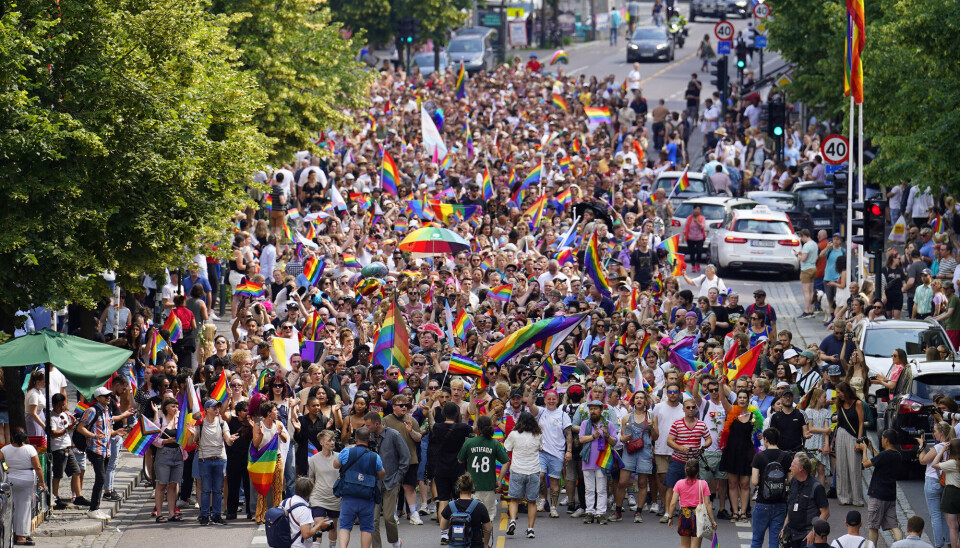
Negative encounters
Attitudes towards queer people have improved drastically in Norway in recent years according to a new report from the Norwegian Directorate for Children, Youth and Family Affairs (link in Norwegian).
83 per cent respond that they are positive about two people of the same sex living together, compared to 70 per cent in 2008.
This however still means that 17 per cent of Norwegians do not approve of same-sex couples living together.
Back in 2019, one in four queer people said that they had experienced hate speech (link in Norwegian) in the past year.
“To be queer in Norway is to experience negative encounters with others because you are queer,” Eggebø says.
“It can be anything from subtle remarks and excessive curiosity to gross violence and murder.”
Knowing that you are exposed
Knowing that you can be exposed to violence because you are queer contributes to fear and feelings of vigilance, Eggebø explains.
“It makes you take precautions. This terrorist attack reinforces these feelings. Those of us who were not afraid before are afraid now,” she says.
Threats and hate speech do not only affect those who experience it directly.
“What we have seen when we have studied hate speech is that it can scare people from speaking out and participating,” Audun Fladmoe said to forskning.no recently (link in Norwegian). He is a researcher at the Institute for Social Research.
“It also applies to being part of a minority group where you might observe that others in the same group are exposed to threats or hate speech. This will make you become more careful yourself,” Fladmoe said.
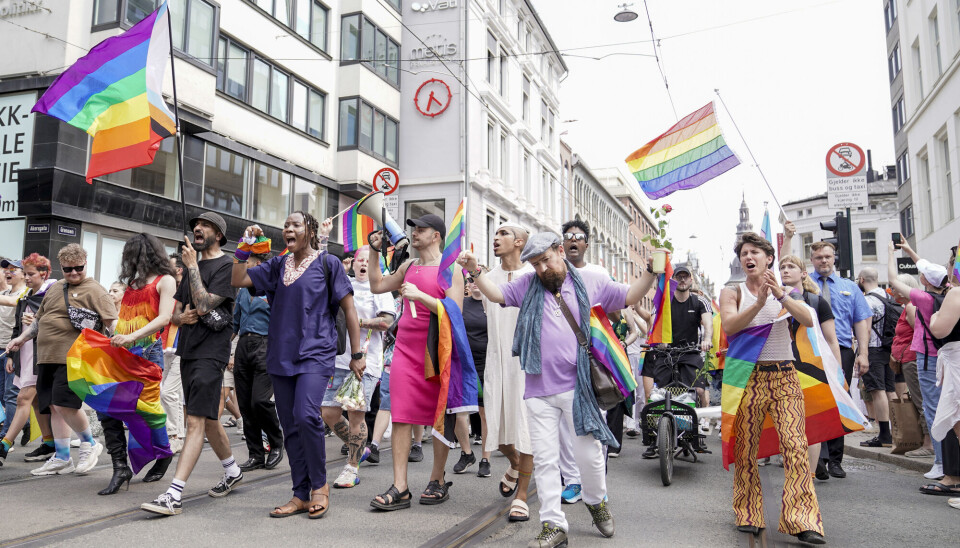
Conservative immigrants and tolerant white folks
Eggebø and Stubberud have conducted interviews with 65 queer people in their studies of being queer in the countryside, and being queer with an immigrant background.
Their findings suggest that it is generally okay to be queer in Norway. Nevertheless, in some environments or certain situations, being queer is difficult or unsafe.
The dominant cultural narrative about the prevalence of homophobia in immigrant communities is part of a larger narrative about conservative immigrants and tolerant whites, Eggebø and Stubberud write in their book chapter.
The stories told through the interviews contribute to an understanding that reality is more nuanced than that.
“This is research is qualitative, not representative. We have chosen to highlight the clearest stories,” Eggebø says about the stories that have been included in the chapter.
What all the stories have in common is that they are about real lived lives. And they show that there are still many who find it difficult to balance being queer and at the same time being part of another minority.
At the same time, these difficulties incorporate both homophobia and transphobia in immigrant communities as well as a notion in the general culture of how people with an immigrant background are, which in turn is based on racist stereotypes.
Through the interviews, Eggebø and Stubberud understood that racism from the majority white Norwegian society is, in most cases, the biggest problem in the lives of queers with a minority background. Not homophobia within the minority communities, as the dominant cultural narrative outlines.
Queering the countryside
After the attack, Eggebø has talked a lot about the attack with fellow researcher Stubberud.
“We are very affected by the incident,” Eggebø says. “The paradox is that the countryside may appear to be a safer place now compared to Oslo.”
And while this year’s pride parade was canceled in Oslo, pride events have flourished elsewhere in the country, including in small villages.
“We are both very happy that for instance Steigen pride, in Northern Norway, could continue as planned. Pride is otherwise very strongly associated with Oslo, where the biggest celebrations take place,” says Eggebø.
“The safe places where pride can be celebrated are suddenly not in Oslo, but all other places that have not been connected as strongly to queer lives and pride celebrations before,” she says.
It will probably contribute over time to the cultural dominant narrative changing – and to the countryside no longer being synonymous with a sad life for queers, Eggebø believes.
Pride all year round
Alex Benjamin Jørgensen clearly states that pride is not over when sciencenorway.no asks him how the organisation coped with the fact that this year's pride parade was canceled.
“I do not think that pride was canceled. I dressed as I wanted. I wore earrings and I have a boyfriend. That's what pride is to me. When I create content for Oslo Pride and fight for LGBTQ+ rights, and when I speak out against homophobia, that is pride for me,” Jørgensen says.
“We have 365 days a year to keep pride going. We only celebrate it this one weekend a year. No one can cancel feeling proud,” he adds. “I think next year will be even bigger. We will return – stronger and more powerful.”
———
Translated by Alette Bjordal Gjellesvik.







